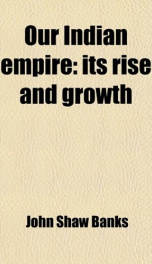our indian empire its rise and growth

Purchase of this book includes free trial access to www.million-books.com where you can read more than a million books for free. This is an OCR edition with typos. Excerpt from book: CHAPTER II. TO THE BATTLE OF PLA8SET, 1757, AND THE END OF CLIVE's FIRST ADMINISTRATION, 1760âTHE STRUGGLE WITH THE FRENCH. ' T is an old story by this time, that the British empire in India grew out of a trading company. So imperceptible and undesigned was the growth, that it would not be easy to say where trading ended and government began. For a long time the two characters were inextricably blended. Each separate step seemed to follow by inevitable necessity. To point out any alternative course would be difficult. And yet the total result is what we see. The first English company for trading with the East Indies was formed in 1599, during the reign of Elizabeth in England and Akbar in India. The circumstances which led to the company being formed were, the great wealth derived by the Portuguese from their Eastern trade, and the reports brought home by an Englishman called Fitch, who a few years before had travelled with some companions through the whole extent of India. The first charter was issued in 1600, granting a monopoly of the trade for fifteen years. The first trading fleet consisted of five vessels, and sailed from Torbay in 1601, the forerunner of countless fleets, mercantile and warlike, since. We may note that in the charter of 1661 the company were authorized to deport to England all unlicensed Englishmen and to administer justice, two undoubted functions of government. Throughout its history the East India Company never lost its jealousy of the ' interlopers ' who infringed its monopoly. The first English factory was established at Surat, one hundred and eighty miles to the north of Bombay, and was confirmed by a firman of the Emperor Jehanghir in 1613. For a century and a half after this tho English establishments in India con- FIRST SETTLEME...
Info about the book
Author:
Series:
Unknown
ASIN:
B0080EUA0I
Rating:
4/5 (2)Your rating:
0/5
Languge:
English
Users who have this book
Users who want this book
What readers are saying
What do you think? Write your own comment on this book!
write a commentif you like our indian empire its rise and growth try:
Other books by this author
Do you want to read a book that interests you? It’s EASY!
Create an account and send a request for reading to other users on the Webpage of the book!

